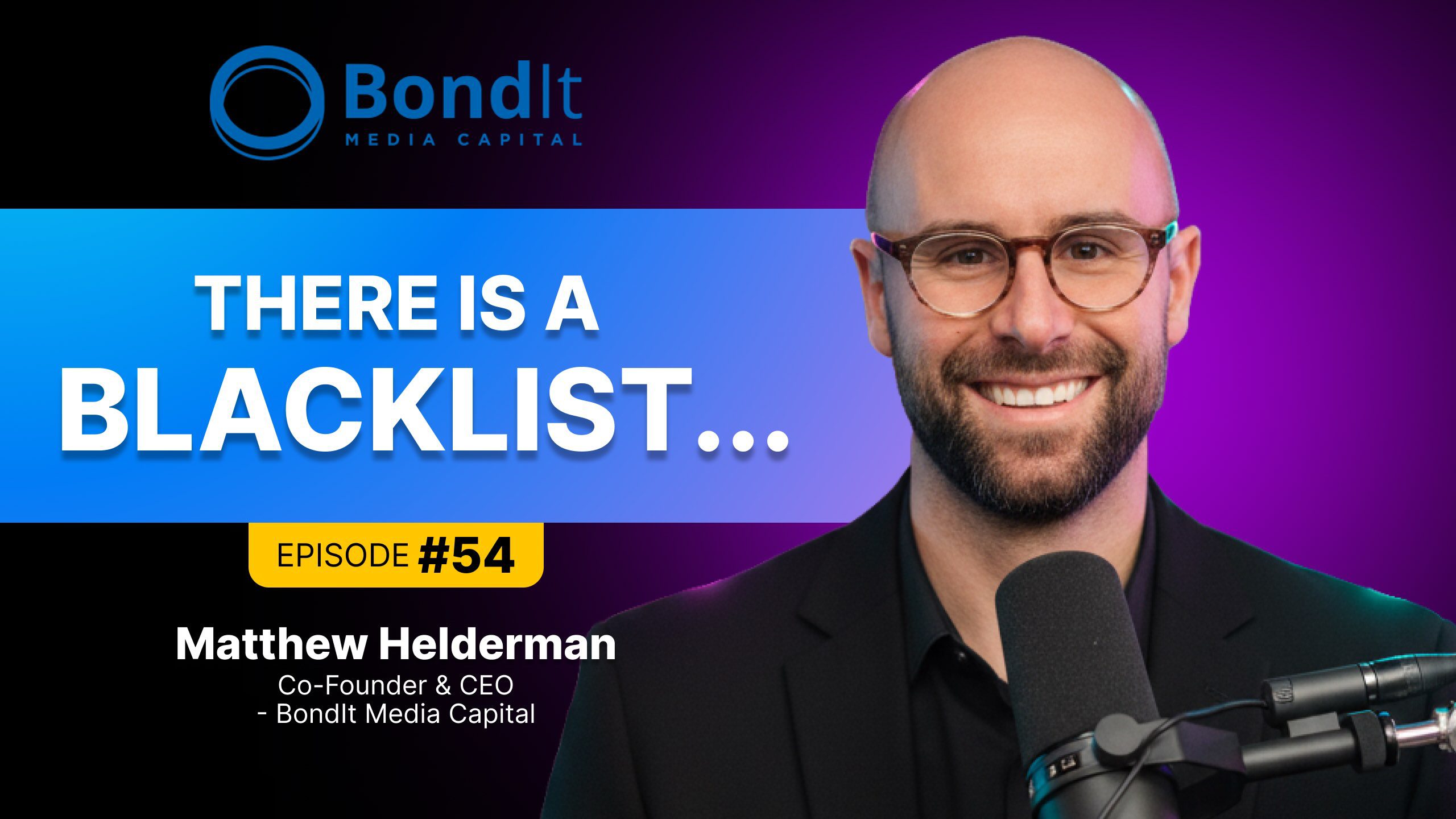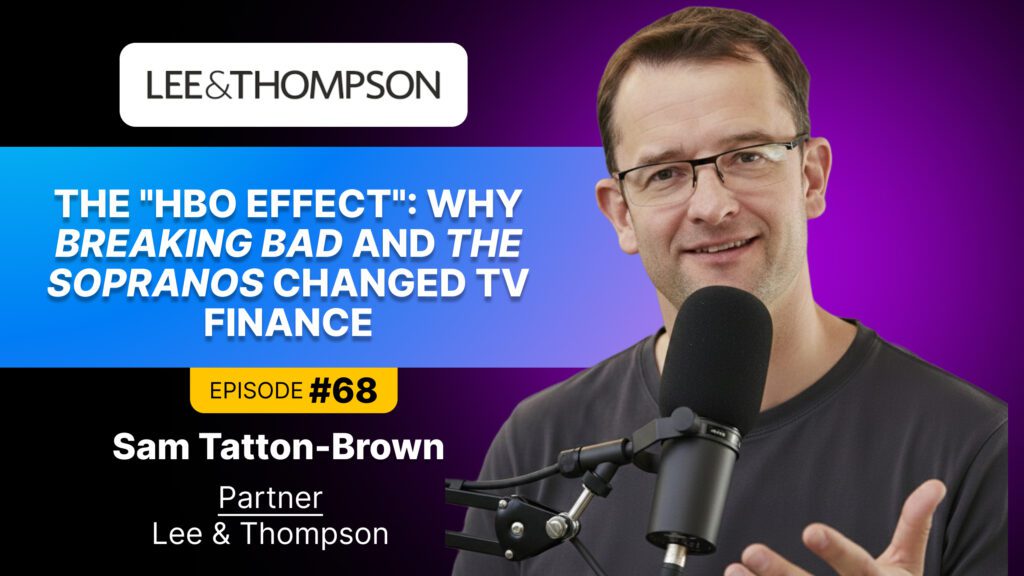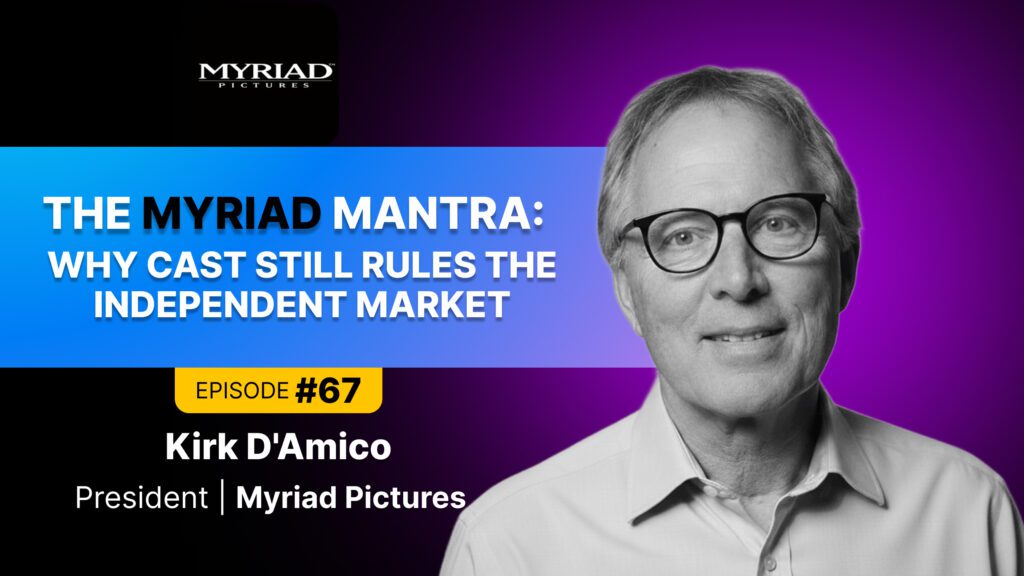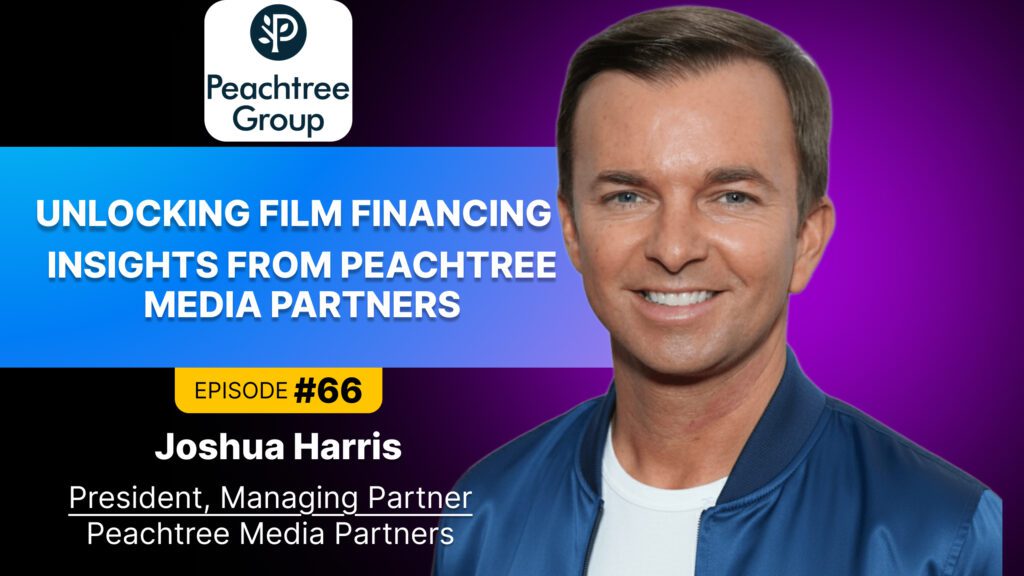I’d say BondIt will shoot more than 50% of its content outside of the U.S. this year. In the history of the company, we’ve seen that stat sort of creeping towards that 50% mark and this will be the first year that it crosses over.
Podcast Chapters
| Timestamp | Chapter Title |
| 03:02 | The Evolution of BondIt Media Capital |
| 06:10 | Founder’s Journey and Company Origins |
| 08:57 | Navigating the Media Financing Landscape |
| 12:12 | Capital Flows and Market Dynamics |
| 15:11 | Challenges in the Entertainment Industry |
| 17:59 | The Playbook for Successful Projects |
| 20:52 | Case Study: Terrifier and IP Value |
| 23:56 | Current Challenges in Media Financing |
| 27:09 | The Changing Landscape of Media Financing |
| 28:22 | International Markets and Project Budgets |
| 30:51 | Challenges in Project Approval |
| 39:03 | Building an Ecosystem for Storytellers |
| 43:04 | The Role of AI and Future Outlook |
Key Takeaways: Kissing frogs; 50% International
- “A buyer is going to buy it for $5 million. So who’s, who’s taking the $15 million write-downs? It’s not our business. We’re not interested in that.”
- “A lot of our business is kissing frogs early on and learning where not to do that again… I would just suggest to folks, kiss those frogs without putting any binding agreement in place with them…”
- “Bondit will shoot more than 50% of its content outside of the U.S. this year… this will be the first year that it crosses over.”
- “We have something very fun up our sleeve, which is building basically a consumer level post-production piece of software that we’re going to offer out into the market that is AI driven. … Why doesn’t everyone have access to Hollywood level post-production suite of tools?”
- “If you’re a capital provider… you can deploy that capital across the full 100 units [of a person’s media diet].”
There’s an entertainment bank in town that circulates a quarterly blacklist of producers, buyers, distributors that all the financiers look at.
Sound Bites:
- Who’s taking the $15 million write-down? It’s not our business.
- We track the number of bankruptcies and defense-driven mergers.
- The ability to make high outsized level returns in film and TV has just shrunk.
- We’ve seen equity come way down as a result… and so to sort of compensate for it, we’ve seen different types of soft money and tax incentives around the globe.
- There’s probably 10 to 20% of our portfolio sits in GAAP… But there’s only a handful of companies you can really take that risk with.
Projects Mentioned in the Podcast
Why Partner With BondIt Media Capital?
- A Reliable Source of Capital: BondIt was created to fill the void in media financing after banks pulled back from content risk due to regulations like the Dodd-Frank Act.
- Expert Underwriting: The company reviews over 1,200 deals annually and has a refined investment thesis, allowing them to quickly identify commercially viable projects and avoid common pitfalls.
- Speed and Flexibility: BondIt provides a crucial advantage over commercial banks, winning deals with its speed and flexible, entrepreneurial approach to capital deployment.
- Integrated Ecosystem: The company is a “flywheel” that extends beyond financing, with a network of businesses including a post-production firm (Buffalo 8) and a distribution arm that provides added value to partners.
- Forward-Thinking Strategy: By leveraging AI for underwriting and even developing consumer-facing software, BondIt is actively adapting to the rapidly changing media landscape and the rise of short-form content.
In Conversation with Matthew Helderman, Co-founder & CEO at BondIt Media Capital
This written summary provides a quick read of the LeaderSpeak podcast with Matthew Helderman of BondIt Media Capital, presented in a concise Q&A transcript format. The conversation covers the company’s origins, its investment philosophy, the state of the media financing landscape, and future plans.
1. Vitrina: Can you provide some background on the founding of BondIt Media Capital and what market opportunity you identified?
Matthew Helderman: BondIt was founded 13-14 years ago, at a time when traditional bank financing for content had become nearly impossible due to regulations like the Dodd-Frank Act following the credit crisis. We saw a clear market opportunity, driven by this decline in reliable institutional capital and the simultaneous surge in demand for high-quality, interruption-free content from early streaming services like Netflix, Hulu, and Disney. Having come from a background in both production and institutional finance, we were able to bridge the gap between these two worlds.
Quote: “The demand curve went through the roof with places like Netflix and Hulu… decline in availability of institutional and reliable capital.”
2. Vitrina: You’ve deployed a significant amount of capital since your inception. What’s the breakdown of your portfolio, and how do you approach deals that don’t fit your direct criteria?
Matthew Helderman: We have deployed about $500 million from our balance sheet into approximately 450 film and TV projects, with another 50 or so in music, sports, and creator economies. We’ve also deployed another $100-$200 million off-balance sheet by originating deals and arranging them with large asset managers like Fortress, Susquehanna, and Crestline. These institutions want access to the media and entertainment space but often prefer to partner with us rather than being in the trenches themselves, especially for deals that don’t fit our specific parameters.
Quote: “We’ve deployed about $500 million on balance sheet and then probably another hundred to $200 million off balance sheet.”
3. Vitrina: Your company’s creation at a young age is quite remarkable. Can you share the founding story and the journey from Buffalo 8 to BondIt Media Capital?
Matthew Helderman: My co-founding partner, Luke, and I built Buffalo 8 first, starting it in between our junior and senior years of college. We both had a strong interest in entertainment and entrepreneurship, and our first company was really created to house the liability for a film I wrote and directed. After taking the film to LA and seeing the industry firsthand, we realized there was a market for a company that could bridge the gap between East Coast finance and the creative industries in Hollywood. This led to the formation of BondIt, and we adopted a “throw things at the wall, see what works” approach, which has allowed us to grow through various revenue streams while learning to stay focused.
Quote: “If you have a business acumen and you can speak business language… and you also have this real passion for the creative industries. There’s a company to build at this intersection.”
4. Vitrina: How has the capital flow in the industry evolved, especially concerning equity and tax incentives, and what’s BondIt’s role in this landscape?
Matthew Helderman: Over the last decade, we have seen a significant decline in equity financing from private individuals and family offices. This is because the ability to achieve outsized returns has shrunk as major streamers like Netflix and Amazon primarily finance their own internal, data-driven content. To compensate, there has been a massive increase in the use of soft money and tax incentives globally, which is why this year, for the first time, over 50% of the content we finance will be shot outside the US. Our role is to navigate this landscape, and while we do engage in gap financing, we are very careful, only working with a handful of reliable sales and distribution partners.
Quote: “This will be the first year Bondit will shoot more than 50% of its content outside of the US.”
5. Vitrina: In your opinion, where are the biggest gaps in the industry, particularly regarding technology and finance?
Matthew Helderman: Despite the industry’s progressive image, its processes are unbelievably archaic and inefficient, from content creation to delivery and payment. A huge gap exists in the financial supply chain; for example, major streamers often pay out a project’s value over 24 to 36 months, forcing producers to seek financing to pull that cash forward. The elephant in the room is AI, which is an immediate opportunity for efficiency. We’re already using enterprise-level AI to enhance our underwriting, with our team using it to generate instant, insightful analysis that once took analysts hours.
Quote: “It’s remarkable how good even like chat GPT-5 seems to be now around… and the feedback is incredible.”
6. Vitrina: With the current market being the most challenging you’ve seen, what are the primary causes, and what’s the outlook?
Matthew Helderman: The market became challenged toward the end of 2022 when the Federal Reserve began raising interest rates and Netflix reported its first subscriber decline. This triggered a tightening across the industry, with buyers hoarding cash and focusing on in-house production. Simultaneously, foreign theatrical markets have been struggling, making it harder for foreign buyers to justify the expense of bigger projects. We are seeing a high number of bankruptcies and defensive mergers, and while capital will always be the scaffolding for the industry, the way we deploy it will have to fundamentally change. We predict more M&A and a continued shift toward different content formats like short-form and television.
Quote: “I don’t think we’re through it by any stretch. I think we’re still going to see M&A. We’re going to see bankruptcies.”
7. Vitrina: You mentioned 50% of your projects are now international. Which are the top markets, and how do you approach ticket sizes there?
Matthew Helderman: Domestically, our most consistent markets are states with attractive credit programs like New Mexico, Georgia, Mississippi, Kentucky, and Ohio. Abroad, we are very active in the UK and Ireland and are seeing growing interest in Italy, France, and Spain. Australia is also a very hot market with a strong credit program. Our typical ticket size is consistent globally, ranging from $1 million to $15 million, with a sweet spot between $5 million and $10 million. We rarely go higher because larger projects can often access cheaper commercial bank financing. We win deals on speed, flexibility, and an entrepreneurial approach.
Quote: “This will be the first year Bondit will shoot more than 50% of its content outside of the US.”
8. Vitrina: What are the top three reasons for rejecting a project?
Matthew Helderman: The primary reason we reject a project is a misalignment of business expectations. This often means the project has an unrealistic budget relative to its market worth. Someone may tell us a film costs $20 million to make, but we know a buyer will only pay $5 million, and we are not in the business of taking that $15 million write-down. The second reason is the project’s team. The attached cast, director, or even sales company can sometimes be more of a liability than an asset. It is crucial for producers to do their homework and avoid locking in agreements with unreliable partners, as there’s even a circulated industry blacklist that we and other financiers reference before markets. The third reason is simply a lack of a realistic business approach or market fit, such as a project in a historically difficult genre like a $20 million biopic with no equity raised.
Quote: “The pieces that you’ve attached to it are doing more of a disservice, more liability than asset to your package.”
——————————————————————————————————————————–
A Leader in Media Finance: BondIt Media Capital
BondIt Media Capital, founded in 2013, is a global leader in financing for film, TV, music, and experiential entertainment. With its headquarters in Santa Monica, the company has completed over 500 transactions and invested more than $500 million. BondIt offers services including union deposits, pre-sales, gap loans, and tax credit loans. Co-founded by Matthew Helderman and Luke Taylor, the company has been involved in projects with aggregate media spending and worldwide box office revenues exceeding $1.5 billion each.





 Santa Monica, United States of America
Santa Monica, United States of America




